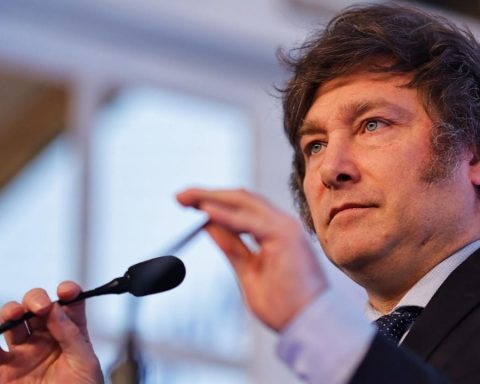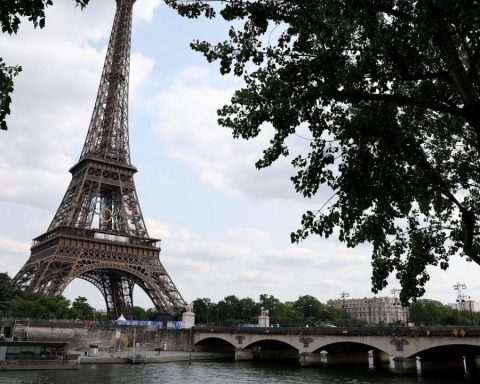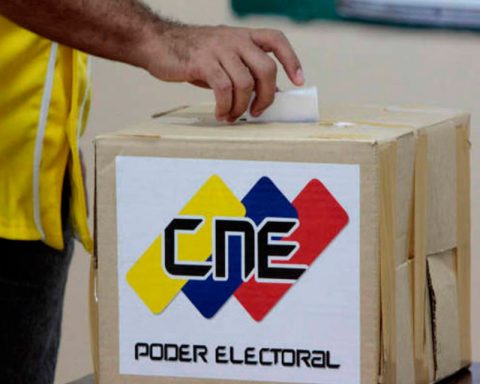Students of public secondary schools of the City of Buenos Aires questioned that the claims have been “individualized and infantilized” that led them “ultimately” to the occupations of establishments and days of struggle during the last week, which they considered to be an example of “an organized and collective student movement” that seeks to build a model “that includes the voices and rights of all the educational community.
This was expressed by Lucía Guttlein and Gael Gómez, from the Juan Pedro Esnaola School of Music; Martina Segretin, from the Juan Ramón Fernández Institute of Higher Education in Living Languages; Brisa Hunglinger, from the Escuela Normal Superior en Lenguas Vivas Mariano Acosta, and Marcos Lainez, from the Nicolás Avellaneda school.
Gathered at the door of the latter institution and after greeting each other with heartfelt hugs, they shared with Télam their reflections a week after the occupation of the Mariano Acosta, a protest that was later joined by more than twenty institutions with occupations, overnight and symbolic hugs in demand of decent food, building improvements and “rethought labor practices”.
“We are not a minority, 26 schools were taken over with the support of their students by almost unanimous votes, and we were in permanent meetings with the Coordinator of Base Students (CEB), the largest in the country”Martina general secretary of the Living Languages Student Center
“Despite all the complaints we have, what they asked us the most this week is what my father thinks about me taking school or about the grades in my newsletter, or if there wasn’t a ‘less violent’ way to complain,” began Lucía (16), general secretary of the Esnaola Student Center.
And he continued: “They end up infantilizing our claims because from adultcentrism, if we are children or adolescents, we have no idea what we want and this is not the case.”
“What we want is to sit down and discuss public education to build an inclusive educational system in which we all have a voice when making the decisions that affect us,” said the teenager.
Coinciding with her peers, Lucía questioned: “They want to take us off the field because we are 16 years old, but we are raising a much more well-founded and well-planned political discussion, which points to public education as something that has to be thought of collectively.”

The students emphasized the growing attempt to atomize the student struggle. “In general, we see that the movement and our demands are increasingly sought to be individualized and not to analyze what is happening in general, in this case with public education,” he said.
Along these lines, Martina (18), general secretary of the Living Languages Student Center, questioned the “minimization” of the student movement when it is said “that we are a few students who take over the schools.”
“We are not a minority, 26 schools were taken over with the support of their students by almost unanimous votes.and we were in permanent meetings with the Coordinator of Base Students (CEB), the largest in the country,” he argued.
And he pointed out: “A minority is the meeting that the Ministry of Education had a few days ago with about 30 students who are solely from their political line.”
The students agreed to highlight the solidarity between different schools during the days of struggle and the collectivization of knowledge.
Since Monday, in addition to the schools already mentioned, the Escuela Normal Superior Lenguas Vivas Sofía Esther Broquen de Spangenberg, the Superior School of Artistic Education in Visual Arts Rogelio Yrurtia, the Superior School Specialized in Ceramics No. , the Rodolfo Walsh, the Osvaldo Pugliese and also the Colegio Nacional Buenos Aires and the Escuela Superior de Comercio Carlos Pellegrini, both dependent on the University of Buenos Aires (UBA), among other institutions.
“In the face of an individualistic educational model, of ‘every man for himself,’ we take over the schools, in an organized and collective manner, because we want to build an education model that integrates the entire educational community and the rights of students, teachers, managers and families“, added Brisa (16), counselor of Genders of Acosta.
Likewise, the students agreed to highlight the solidarity between different schools during the days of struggle and the collectivization of knowledge.
“Those who think that they give us a manual with the step by step for a take, ignore our student organization, which is nourished by the transmission of knowledge between colleagues,” they expressed.

Regarding the slogans that motivated the days of struggle, Gael (16) considered that the student body lowered “the bar of claims” and that the current demands “became the basic and urgent ones to maintain a decent education”, and said that Despite this, the Buenos Aires Minister of Education, Soledad Acuña, ignores them, arguing that “it is not something that had been previously raised.”
“In addition to being a lie, it is very embarrassing that the Minister of Education comes out to say that we never raised it, when in reality, because of her position, she should approach our schools out of obligation and know the reality that we have,” Brisa said. .
In that context, they questioned that the Buenos Aires authorities were not present in the “mediation” space proposed by the City Ombudsman last Thursday.
“Our goal was never to take over schools, it is the last resort in the face of a lack of response, because until this week we were totally invisible,” said Gael, who along with his colleagues stressed that they managed to put youth as a political subject “on the agenda.” .
Male and female students emphasized the desire to “go to learn and enjoy going to school and even an approach to work but with a quality education system that respects what we want in the future.”
However, he maintained that it is “a political decision not to convene a dialogue, as is spending 20 million pesos a day on publicity and a quarter of that in public education.
In this sense, Marcos (16) added that “there is a plan to defund education because not only is it not a priority, but it is directly an expense and We already know what is done with spending: it is cut.
“When those of us who do not agree with that stand up and question these things, they tell us that we are ‘over-ideologized’, that they wash our minds, or that we are lazy people who do not want to study, a very installed idea,” said the Avellaneda spokesman.
In this regard, the students emphasized the desire to “go to learn and enjoy going to school and even an approach to work but with a quality educational system that respects what we want in the future.”


















